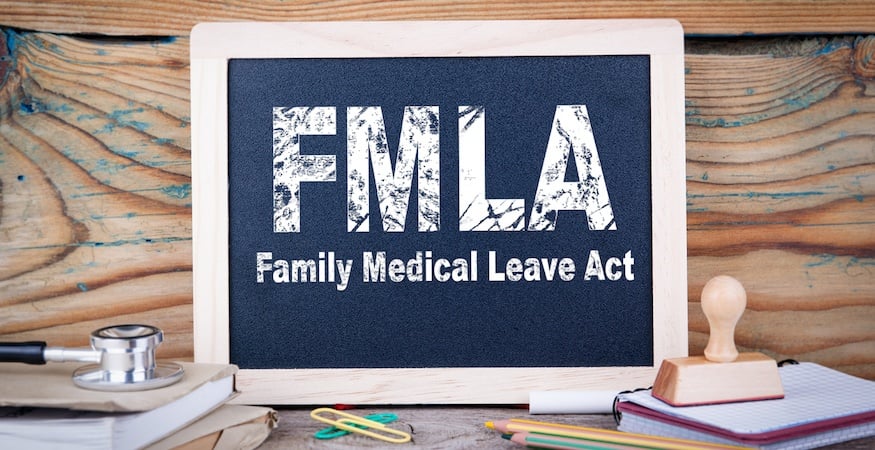Understanding the Family and Medical Leave Act (FMLA)
March 17th, 2021
3 min. read

For decades the subject of leave whether it be sick leave or family and medical leave, paid or unpaid, has been debated in HR circles.
Under federal law, the Family and Medical Leave Act (FMLA) entitles eligible employees of covered employers to take unpaid, job-protected leave for specified family and medical reasons.
Federal labor laws don’t require employers to provide employee sick days nor do they require pay for these days. Instead, the federal government allows such regulations to be determined by states and municipalities.
As of March 2021, 24 states have some version of a family and medical leave law on the books, and Washington, D.C. and 15 states have paid leave laws. This means that employers who operate in these states must comply with at least two FML laws (federal and state) and employers who operate in certain municipalities, or additional states, could have even more laws to track.
Eligibility requirements and other regulatory provisions of these laws aren’t always easy to understand—especially when state and federal laws seem at odds. To help Wisconsin businesses stay compliant, we’ve answered common questions about the similarities and differences between federal FMLA and Wisconsin FMLA laws.
Am I a covered employer under FMLA?
The FMLA doesn’t apply to every business—only employers with 50 or more employees must comply. Under federal law, employers must have 50 or more employees working within a 75-mile radius to be covered.
Under Wisconsin law, employers must have had at least 50 permanent employees during at least 6 of the last 12 months with no radius conditions.
For example, a company can be covered by Wisconsin FMLA with just 40 employees at its headquarters and 10 employees at a branch office 100 miles away. In this example, the company must comply with Wisconsin FMLA, but it would not meet the 75-mile radius requirement for compliance with federal law.
If, however, the company had 50 employees at its headquarters, it would meet the threshold requirements for federal FMLA, so the company would need to comply with both laws.
What kind of leave is covered under FMLA?
General entitlement
Under federal law, eligible employees are entitled to 12 workweeks of leave in a 12-month period for the following reasons:
- Birth of a child and to care for the newborn child within one year of birth
- Placement with the employee of a child for adoption or foster care and to care for the newly placed child within one year of placement
- To care for the employee’s spouse, child, or parent who has a serious health condition
- A serious health condition that makes the employee unable to perform the essential functions of his or her job
- Any qualifying exigency (e.g., common issues such as attending military functions, making financial or legal arrangements, arranging alternative childcare, etc.) arising out of the fact that the employee’s spouse, son, daughter, or parent is a covered military member on “covered active duty.”
Federal FMLA also entitles eligible employees up to 26 workweeks of leave during a single 12-month period to care for a covered servicemember with a serious injury or illness if the eligible employee is the servicemember’s spouse, son, daughter, parent, or next of kin (military caregiver leave).
Wisconsin FMLA entitles eligible employees to take the following unpaid leave in a calendar year:
- Up to six weeks for the birth or adoption of a child
- Up to 2 weeks for serious health condition of parent, child or spouse
- Up to 2 weeks for employee’s own serious health condition
Other protections
Employees under either FMLA are entitled to the continuation of group health insurance coverage under the same conditions as coverage would have been provided if the employee had been continuously employed during the leave period.
Under federal FMLA, the employer may choose to require the employee to substitute paid time off (e.g., accrued PTO or vacation days) for unpaid time.
Under Wisconsin law, however, it’s the employee who has the choice to substitute paid time.
Who is an eligible employee?
Federal law requires that employees must have worked for their employer for at least 12 months and have at least 1,250 hours of service over the previous 12 months.
Wisconsin law requires that employees must have worked for the employer for at least 52 consecutive weeks and for at least 1,000 hours in the preceding 52-week period.
Both eligibility criteria and serious health condition criteria are slightly less stringent under Wisconsin FMLA, so it is possible for employees to qualify for leave under state law but not qualify under federal law.
If an employee qualifies under both laws, the leave period would run concurrently, maxing out at 12 workweeks in a 12-month period. The employee would also have the choice to substitute paid time while the state leave applied.
For example, if you require employees to substitute paid time off for unpaid time during FMLA, the employee could choose to take unpaid time for the duration of state leave (between two to six weeks depending on leave reason) and you would only be able to require PTO substitution for the remainder of the 12-week period.
Still Have FMLA Compliance Questions?
It’s a LOT to know and even the most seasoned HR professionals have questions about what is considered a serious health condition and how to calculate eligibility. Not to mention the challenges of proper documentation and recordkeeping …Plus, the FMLA isn’t the only tricky employment law.
McCloneHR can help!
With regular communication about regulatory requirements, updates and proactive solutions for employment practices, McCloneHR clients don’t need to worry about noncompliance.
If you have questions about how to apply laws in your workplace, our team—including our inhouse compliance attorney—is here with answers and helpful guidance. Please don’t hesitate to reach out for more information.
In the meantime, download our complimentary Visual Cheat Sheet for Workplace Compliance for a quick reference to common questions.
Lisa Van Straten, VP of Human Resources
As vice president of human resources for McClone, Lisa is responsible for all HR functions across five regional locations, employing approximately 100 team members. Lisa passionately fosters the inclusive, family-friendly culture of the organization and believes that work-life balance is integral to employee satisfaction and engagement. As a key member of the McClone Insurance leadership team, Lisa has a unique perspective on employee benefit programs and how they impact recruiting and retention strategies. Prior to joining McClone in 2015, Lisa held a series of strategic leadership positions at WOW Logistics Co. in Appleton. Her knowledge and experience in workplace safety, quality, and operations, in addition to her HR tenure there, makes her a trusted advisor to the McClone team and clients alike. Lisa holds a bachelor’s degree in business administration from the University of Wisconsin – Oshkosh. She has been a member of the Fox Valley SHRM chapter since 2004, and has served in multiple board positions, including president from 2009-2010.








